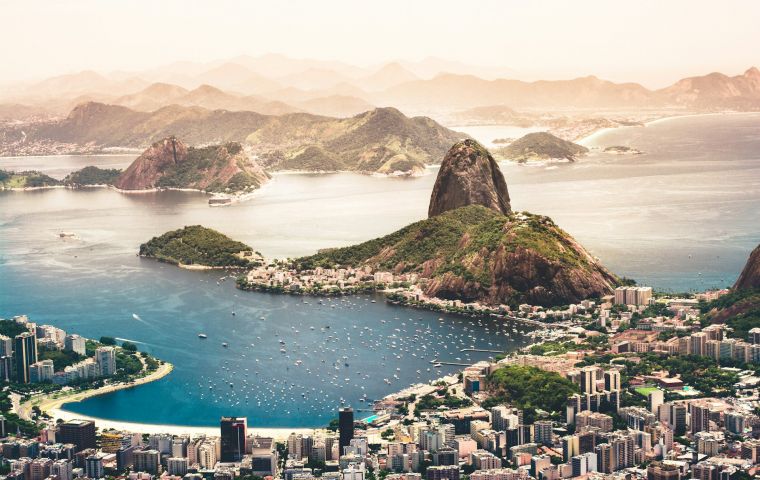MercoPress. South Atlantic News Agency
The Complex Gambling Laws of the South Atlantic
 Explore South Atlantic gambling regulations from Brazil to the islands. We give you an overview of this complex landscape. Photo: Agustín Díaz / Unsplash
Explore South Atlantic gambling regulations from Brazil to the islands. We give you an overview of this complex landscape. Photo: Agustín Díaz / Unsplash Trying to understand gambling rules in the South Atlantic? Good luck with that. This region has some of the most head-scratching and contradictory betting laws you'll find anywhere. From surprisingly strict island territories to unexpectedly relaxed mainland spots, the regulations change dramatically depending on where you drop your anchor.
A Messy Quilt of Rules
The South Atlantic isn't just geographically scattered - its gambling laws are all over the place too. Each territory has cooked up its own approach, many still carrying the hangover of colonial rules that somehow survived into the 2020s.
Tristan da Cunha, that impossibly remote island chain, keeps tight British-style gambling restrictions despite being literally in the middle of nowhere. Meanwhile, Saint Helena, not that far away (at least by South Atlantic standards), lets people place certain bets that would get you in trouble with authorities on Tristan.
A gambling industry report from last year showed the South Atlantic region scored just 42 out of 100 on regulatory consistency. Most other regions averaged around 68. Honestly, it's no wonder tourists get confused.
Brazil's Coastal Gambling: Major Changes Coming
Brazil's massive Atlantic coastline represents the biggest gambling market in the region. And it's going through a huge overhaul right now.
For the longest time, most gambling was technically against the law but happened anyway. “Bingo halls” operated as mini-casinos through various loopholes, and enforcement was spotty at best. What was written in law and what happened in real life were two completely different stories.
In 2023, Brazil finally started fixing this mess. They passed Bill PL 442/91 to create actual rules for all types of gambling. They're rolling it out in stages, and the whole system should be up and running by 2026.
A gaming analyst from São Paulo Financial thinks Brazil's gambling market could hit $12.5 billion once it's fully regulated. That's big enough to change the gambling scene across the entire South Atlantic region.
The Falklands: Where Nothing Makes Sense
The Falkland Islands perfectly showcase this regulatory mess. You won't find any proper casinos there, but walk through Stanley (the capital) and you'll spot several betting shops taking wagers on everything from soccer matches to horse races. Yet somehow, slot machines remain mostly illegal unless they're in specific approved locations. Make it make sense.
Their approach to online gambling adds another layer of “wait, what?” The local government basically shrugged and admitted they can't really control what people do online anyway.
This approach looks a lot like what happens in New Zealand. Neither region has officially approved online casinos, but people use offshore sites anyway. Falkland Islanders basically have the same experience as those using online casinos in NZ - technically, it's a gray area, but nobody's getting arrested for playing some virtual blackjack at home.
International Waters: Where Rules Don't Apply
One of the weirder parts of South Atlantic gambling involves what happens when you're not in any country at all.
Cruise ships in international waters become floating casinos outside any country's jurisdiction. Once these ships reach 12 nautical miles from shore, they hit this legal sweet spot where gambling prohibitions vanish. This created a whole industry of “casino cruises” that leave from places with strict rules just so people can legally gamble once they're far enough out.
Royal Caribbean runs a ship called “Atlantic Wonder” from Santos, Brazil, that's designed to reach international waters quickly. Their biggest vessel fits 2,800 passengers and has 350 slot machines and 45 gaming tables. None of these games operate until they're in international waters.
Digital Gambling Making a Mess of Everything
Traditional borders mean less in the digital age, giving South Atlantic regulators major headaches.
Crypto gambling makes things even more complicated since blockchain betting bypasses normal banking systems entirely. Argentina's coastal areas can't agree on how to handle this. Buenos Aires Province went all-in on digital gambling regulation in 2020. Yet neighboring Chubut still forbids it completely. So people living just a few miles apart face totally different legal situations when opening the same gambling website.
Strange Local Rules
Every South Atlantic territory seems to have its own weird gambling quirks.
Ascension Island gives special tax breaks to charitable bingo that no other form of gambling gets. Uruguay allows casinos but only through the government's Casinos del Estado operation.
Strangest might be Georgia's South Sandwich Islands territory. Gambling is technically legal there based on 1800s rules nobody ever bothered to update. No casinos actually operate there - the islands are basically empty except for some research stations. But the outdated law is still officially on the books.
What's Next for South Atlantic Gambling
The gambling scene across the South Atlantic is changing fast. Brazil's big regulatory overhaul will probably push smaller territories to update their approaches too. Digital enforcement tech is getting better, but so are the methods people use to get around geofencing and other restrictions.
For anyone traveling through the region, these complex and contradictory regulations can be a real headache. When visiting, it's worth checking local laws carefully. What's perfectly fine in one place might get you in trouble just a short boat ride away.
As technology keeps blurring boundaries, the pressure grows for these places to harmonize their rules. Until then, the South Atlantic remains one of the world's most confusing and fascinating places when it comes to gambling laws.




Top Comments
Disclaimer & comment rulesCommenting for this story is now closed.
If you have a Facebook account, become a fan and comment on our Facebook Page!